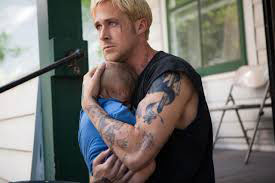By Colleen Glenn

Ellis (Tye Sheridan) and Neckbone (Jacob Lofland) strike an unlikely friendship with a wanted man, Mud (Matthew McConaughey).
Every now and then, a film comes along that feels authentic and startlingly fresh. This rarity happened twice this spring, as two such films graced the screen at the Kentucky Theatre during April/May: Mud (dir: Jeff Nichols) and The Place Beyond the Pines (dir: Derek Cianfrance).
Although the Kentucky Theatre had to cancel its special premiere of Mud when Oscar-nominated, Lexington native actor Michael Shannon’s shooting schedule on HBO’s “Boardwalk Empire” changed, you should still get down to the Kentucky to see the film. The theatre, currently in the expensive process of converting to digital projection, still needs funds to support this transition, and Mud will not disappoint.
Set in Arkansas, Mud’s emphasis on the Mississippi River and its sub-culture invariably conjures the spirit of Huck Finn, complete with its absentee parents, cycles of domestic abuse, and respect for the flowing body of water that defines its protagonists. Yet, screenwriter and director Jeff Nichols’ vision of the South feels more akin to Faulkner than to Twain: for Nichols, the South is a place where our memories and our personal histories work as traps, keeping us tethered to pain and to familiar places.
In the case of Mud (Matthew McConaughey), his all-consuming love for his first love, Juniper (Reese Witherspoon), has literally confined him to an uninhabited island on the river, where he hides after having killed a man who brutally abused her. When two young teenage boys, Ellis (Tye Sheridan) and Neckbone (Jacob Lofland), discover Mud living in the abandoned boat they had claimed as their own, an unlikely friendship develops between the three, but particularly between Mud and Ellis, who draws closer to Mud as he distances himself from his own father. Initially, Ellis supplies Mud with food, but eventually, he and Neckbone go to great lengths to provide Mud with the necessary supplies to refurbish the boat so that Mud can escape.
Mud boasts incredibly strong and compelling performances from an array of actors. Undoubtedly, Mud represents one of McConaughey’s strongest film performances to date: he resists the urge to be charming and instead relies on an understated presence that creates a captivating, drifting character. Most impressive are Sheridan and Lofland, who prove their nascent acting chops with aplomb against a solid and experienced cast. Lexington has reason to be proud of this film, as two actors we lay claim to, Sam Shepard, who lives in Midway, and Michael Shannon (who starred in Nichols’ Take Shelter (2011)), turn out terrific performances in important supporting roles. Like Mud, the mysterious recluse Tom Blankenship (Shepard) and Neckbone’s Uncle Galen (Shannon) serve as surrogate parents in a world where mothers and fathers seem scarce or inept, though the surrogates, too, fumble clumsily to guide their charges. Witherspoon is really the only casting choice that doesn’t pay off: her star persona is distracting and unnecessary in a supporting role that would have benefitted more from a lesser-known actor.
Mud’s languid pacing and meditative style are punctuated by moments of intense emotion and suspense, and like other movies that have contemplated the power of a river (Apocalypse Now, The Mosquito Coast), there is a magical realism at work in the relationship of man and nature. In another river film, Aguirre, the Wrath of God, the boat that hangs in the trees towards the film’s end, presumably the result of a flood years ago, serves as a token of previous human failure to survive the river and predicts Aguirre’s demise; in Mud, the boat in the trees becomes a gift from above that will ensure Mud’s future.
Though The Place Beyond the Pines is set in Schenectady, NY, it, too, arguably belongs to the realm of the Southern Gothic, where poverty, violence, and alienation seem part and parcel of a landscape that is at once both mystical and wasted. Trailer parks, scrap yards, forests, and roads become part of the muted visual landscape of both movies, which, as their titles indicate, ground themselves in (dark) places. Like Mud, Beyond the Pines is a coming of age story—or rather, it becomes one—as two teenage boys discover and come to grips with the actions of their fathers.
Beyond the Pines is ultimately less successful as a film than Mud, but its opening act, which reunites director Derek Cianfrance with Ryan Gosling (Blue Velvet (2010)), remains the most arresting piece of film I have seen in a very long time. This section of the movie deals with motorcycle stunt rider Luke (Gosling), his discovery of the existence of a child he did not know he had fathered, and his subsequent attempts to reinstate himself as the father of his son. Though the mother, Romina (Eva Mendes) appears to love Luke, she has chosen to raise her son with Kofi (Mahershala Ali), a far more stable partner than the adrenaline junkie Luke, who travels from small town to small town on a carnival act circuit. At the suggestion of his newfound friend Robin (Ben Mendelsohn), Luke begins robbing banks in order to financially provide for his small, estranged family and to win them back. Eventually, Luke’s bank robbing and getaway sprees on his motorcycle catch up with him, and he comes face to face with the local law enforcement, in the form of Avery (Bradley Cooper).
The second and third acts I found far less interesting, as the second one becomes a cliché police drama, though it had the potential to be something much more unique, and the third act, which deals with the seemingly inevitable meeting between the sons of Avery and Luke, wavers between a teen drama, a morality play, and a public service announcement. Thankfully, neither AJ (Emory Cohen) nor Jason (Dane DeHaan) utter, “I learned it by watching you!” but the “sins of the father” theme is so heavy-handed that it’s a wonder they did not. They could have saved time and money by pulling stock footage from any number of commercials or movies rather than shoot the formulaic final image of the film.
Despite its shortcomings, however, the movie is compelling from start to finish, creating an ongoing tension as a sinister force seems at work in every scene. But nothing in the last two-thirds of the film compares to the first act, which is dominated by a superb performance by Gosling, who is as heartbreakingly vulnerable and short-sighted as he is genuine and resolute. His tattooed body, like Mud’s, reads like a map of scars: in many shots, he looks like a boy whose age caught up with him. Most of all, though, Gosling radiates the kind of intense loneliness that makes one truly desperate: desperate to do right, to connect with his son, to be a meaningful part of this world. Although the film offers many strong performances, Ben Mendelsohn deserves particular notice for his highly moving and realistic rendition of Robin, a fatherly figure-friend who seeks to help Luke but ultimately leads him horribly astray. Bradley Cooper delivers a fine performance, but makes much less of an impact than Gosling, who plays the more intriguing character. Ray Liotta, as a corrupt police detective, is underused in a section of the story that badly needed original development.
Like Mud, A Place Beyond the Pines seems taken with movement and place: the cinematography in each film captures characters in motion, whether reckless or passive, against backdrops at once banal and magnificent. The frenetic shots of Luke racing through the woods, like the shots of Ellis sitting in the back of his dad’s truck watching the town drift by, remain hauntingly beautiful moments of escape within a much wider realm of stagnation—indications that change will come, one way or another.




Leave a Reply